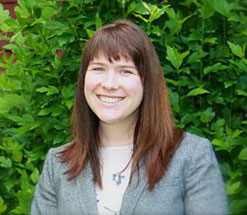Ashley Taylor, Colgate University – Intellectual Disability and the Production of Knowledge
 Who can be a producer of knowledge?
Who can be a producer of knowledge?
Ashley Taylor, assistant professor of educational studies at Colgate University, challenges a stigma.
I am Assistant Professor of Educational Studies at Colgate University. I teach educational foundations courses in disability studies, inclusive education, and philosophy of education.
I received my Ph.D. in Cultural Foundations of Education at Syracuse University, where I specialized in Philosophy of Education and Disability Studies. I am especially interested in how citizenship and social belonging are conceptualized in relation to and experienced by people labeled with disabilities, and how institutions and processes of education shape and mediate these concepts and experiences. Much of my work considers the normative question of what constitutes educational justice for individuals labeled with intellectual disabilities. More broadly, I am interested in the intersections of ability, gender, and race in educational philosophy and theory. In all of my work, I view disability (and ability) in terms of its status as a gendered and racialized cultural, social, and political position both created and augmented through educational systems.
I hold an M.S. in Cultural Foundations of Education and a C.A.S. in Disability Studies from Syracuse University. My B.A. is in Contemporary Studies and Philosophy from the University of King’s College in Nova Scotia, Canada. Before pursuing graduate work, I worked as a caregiver and as an employment counselor/adult educator of people labeled with intellectual and physical disabilities.
Intellectual Disability and the Production of Knowledge
Researchers aren’t likely to have intellectual disabilities. In fact, people with intellectual disability labels aren’t usually active participants in the creation of social meanings about them. Is this simply a consequence of their disability? Or is there something else going on?
In a recent article published in Harvard Educational Review I challenge unexamined beliefs about intellectual disability that are behind the assumption that people so labeled aren’t producing research because of their disability. I argue that able-minded people have significant, and unjust, power in defining who counts as a producer of knowledge. Within this climate, the voices and first-person experiences of people labeled with intellectual disabilities are at risk of being minimized, misinterpreted, and even outright dismissed.
People with intellectual disability labels frequently experience a kind of injustice that undermines their status as a knower. In some cases it’s because behavior that is associated with their disability – speech patterns or non-verbal communication – is taken as evidence of their intellectual incompetence. In other cases, the label itself becomes a description of total incompetence. Simultaneously, the prevalent idea that such labeled people are child-like reinforces the notion that their exclusion is benign and naturalizes their non-participation in knowledge production.
Research produced within such contexts legitimates educational practices that deny civic opportunities to people labeled with intellectual disabilities: for example, they are rarely represented in social studies curricula and aren’t granted substantive opportunities to learn about regular practices of citizenship. When labeled young people are not taught to regard themselves as future citizens, nor as potential contributors to educational policy, practice, and theory, then their education is reproductive of their disempowerment and marginalization. To change this pattern, researchers can create substantive opportunities for people with intellectual disability labels to be positioned as experts, a stance that first requires evaluating assumptions of able-minded normalcy in our research practices.


